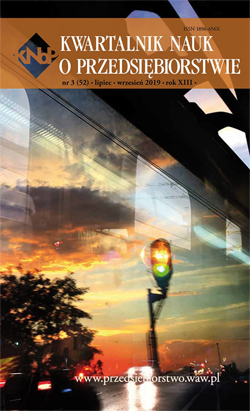Abstrakt
Rynek pracy podlega obecnie głębokim zmianom, takim jak wzrost znaczenia krótkoterminowych relacji pomiędzy pracownikiem i pracodawcą, zmiana samej natury pracodawcy, automatyzacja wielu miejsc pracy. Zmiany globalnej pracy wymagają ciągłego monitorowania czy instytucjonalny model stosunków pracy jest dostosowany do zmieniającej się rzeczywistości. Elementem tego modelu są prawnie usankcjonowane grupy, które mogą konsultować i negocjować obowiązujące ramy współdziałania. Celem artykułu jest zaprezentowanie kierunku zmian instytucjonalnego modelu stosunków pracy w Polsce na przykładzie formalnego zdefiniowania głównych grup interesariuszy tego rynku. Za podstawę analizy (desk research) przyjęto dokumenty formalne ILO. Artykuł przedstawia proponowane zmiany w klasyfikacji uczestników rynku pracy. W publikacji zwrócono uwagę na wzrost znaczenia samozatrudnienia oraz na coraz mniejszą reprezentatywność organizacji uznawanych dotychczas za głównych aktorów tego rynku – związki zawodowe i organizacje pracodawców. Dowiedziono, że stosowane na tradycyjnym rynku pracy definicje i klasyfikacje poszczególnych grup nie są wystarczające do monitorowania bieżących trendów.
Full Text
Bibliografia
Acemoglu, D., Restrepo P. (2017), Robots and Jobs: Evidence from Us Labor Markets (March 2017), NBER Working Paper No. w 23285, SSRN: https://ssrn.com/abstract=2941263, dostęp: 15.03.2019.
Coase R.H. (1988), The Nature of the Firm: Origin, “Journal of Law, Economics, & Organization”, Vol. 4, No. 1, p. 3-17.
De Stefano V. (2016), The rise of the ‘ just-in-time workforce’: On-demand work, crowdwork and labour protection in the ‘gig-economy’ (Geneva, ILO), http://www.ilo.org/travail/whatwedo/publications/WCMS_443267/lang--en/index.htm, dostęp: 15.03.2019.
Dwyer C. (2016), Contingent workforce management: 2016 technology and innovation outlook, Boston, Ardent Partners SAP Fieldglass.
GUS (2018), Aktywność ekonomiczna ludności Polski IV kwartał 2017 roku. Dane z badania BAEL, Główny Urząd Statystyczny, Warszawa 2018.
Employment Flexibility Index EU and OECD countries, 2019, Lithuanian Free Market Institute, https://en.llri.lt/wp-content/uploads/2018/12/Employment-flexibility-index-2019.pdf, dostęp:
03.2019.
Gates B. (2017), Bill Gates calls for income tax on robots, “Financial Times”, 19.02.2017, https://www.ft.com/content/d04a89c2-f6c8-11e6-9516-2d969e0d3b65, dostęp: 15.03.2019.
Gładoch M. (2018), Projekt Kodeksu pracy to partyzancka rewolucja, „Money.pl”, 9.03.2018, https://www.money.pl/gospodarka/wiadomosci/artykul/kodeks-pracy-prof-monika-gladoch-prawopracy, 72,0,2400328.html, dostęp: 15.03.2019.
Harari Y.N. (2018), 21 lekcji na XXI wiek, Kraków, Wydawnictwo Literackie.
ILO (1993), Fifteenth International Conference of Labour Statisticians, Report of the Conference, ICLS/15/D.6 (Rev. 1), International Labour Office, Geneva, http://laborsta.ilo.org/applv8/data/icsee.html.
ILO (2015), Non-standard forms of employment – Report for discussion at the Meeting of Experts on Non-Standard Forms of Employment, Geneva, 16–19 February 2015, International Labour Office, Geneva.
ILO (2016a), The Future of Work. Centenary Initiative, 3 Issue Note Series https://www.ilo.org, dostęp: 15.03.2019.
ILO (2016b), Key indicators of the labour market – ninth edition, International Labour Office, http://www.ilo.org, dostęp: 15.03.2019.
ILO ICLS (2018a), Report II Statistics on work relationships, 20th International Conference of Labour Statisticians, ICLS/20/2018/2.
ILO ICLS (2018b), Report General, 20th International Conference of Labour Statisticians, ICLS/20/2018/1.
Katz L., Krueger L. (2019), The Rise and Nature of Alternative Work Arrangements in the United States, 1995-2015, “ILR Review”, Vol. 72(2), p. 382-416.
Leceta J.M., Renda A., Könnölä T., Simonelli F. (2017), Unleashing Innovation and Entrepreneurship in Europe. People, Places and Policies, Bruksela, CEPS.
OECD (2016), OECD Economic Surveys POLAND, https://www.oecd.org/eco/surveys/Poland-2016-overview.pdf, dostęp: 15.03.2019.
Palacios-Huerta I. (ed.) (2013), In 100 years: leading economists predicting the future, Cambridge, MA: MIT Press.
Popma J. (2013), The Janus face of the ‘new ways of work’: Rise, risks and regulation of nomadic work, Brussels, ETUI.
Reich R. (2000), The Future of Success. Working and Living in the New Economy, New York, Vintage Book.
Rifkin J. (2001), The Age of Access: The New Culture of Hypercapitalism, Where all of Life is a Paid-For Experience, New York, Penguin Putnam.
Rifkin J. (2014), The Zero Marginal Cost Society. The Internet Of Things, The Collaborative Commons and The Eclipse Of Capitalism, New York, Palgrave Macmillan.
Scholz T. (ed.) (2013), Digital Labor, The Internet as Playground and Factory, New York, Routledge.
Schwab K.M. (2018), Czwarta rewolucja przemysłowa, World Economic Forum, Warszawa, Wydawnictwo Studio EMKA.
Skrzek-Lubasińska M., Szaban J.M. (2018), Nomenclature and harmonized criteria for the selfemployment categorisation. An approach pursuant to a systematic review of the literature, “European Management Journal”, https://doi.org/10.1016/j.emj.2018.11.001, dostęp: 15.03.2019.
Smith R., Leberstein S. (2015), Rights on demand: Ensuring workplace standards and worker security in the on-demand economy, New York, National Employment Law Project, http://www.nelp.org/publication/rights-on-demand/, dostęp: 15.03.2019.
Supiot A. (2001), Beyond employment – Changes in work and the future of Labour Law in Europe, Oxford, Oxford University Press.
Tapscott D. (2014), The Digital Economy ANNIVERSARY EDITION: Rethinking Promise and Peril in the Age of Networked Intelligence, New York, McGraw Hill Professional.
Autor
Autor (Autorzy) artykułu oświadcza, że przesłane opracowanie nie narusza praw autorskich osób trzecich. Wyraża zgodę na poddanie artykułu procedurze recenzji oraz dokonanie zmian redakcyjnych. Przenosi nieodpłatnie na Oficynę Wydawniczą SGH autorskie prawa majątkowe do utworu na polach eksploatacji wymienionych w art. 50 Ustawy z dnia 4 lutego 1994 r. o prawie autorskim i prawach pokrewnych – pod warunkiem, że praca została zaakceptowana do publikacji i opublikowana.
Oficyna Wydawnicza SGH posiada autorskie prawa majątkowe do wszystkich treści czasopisma. Zamieszczenie tekstu artykuły w repozytorium, na stronie domowej autora lub na innej stronie jest dozwolone o ile nie wiąże się z pozyskiwaniem korzyści majątkowych, a tekst wyposażony będzie w informacje źródłowe (w tym również tytuł, rok, numer i adres internetowy czasopisma).
Osoby zainteresowane komercyjnym wykorzystaniem zawartości czasopisma proszone są o kontakt z Redakcją.

